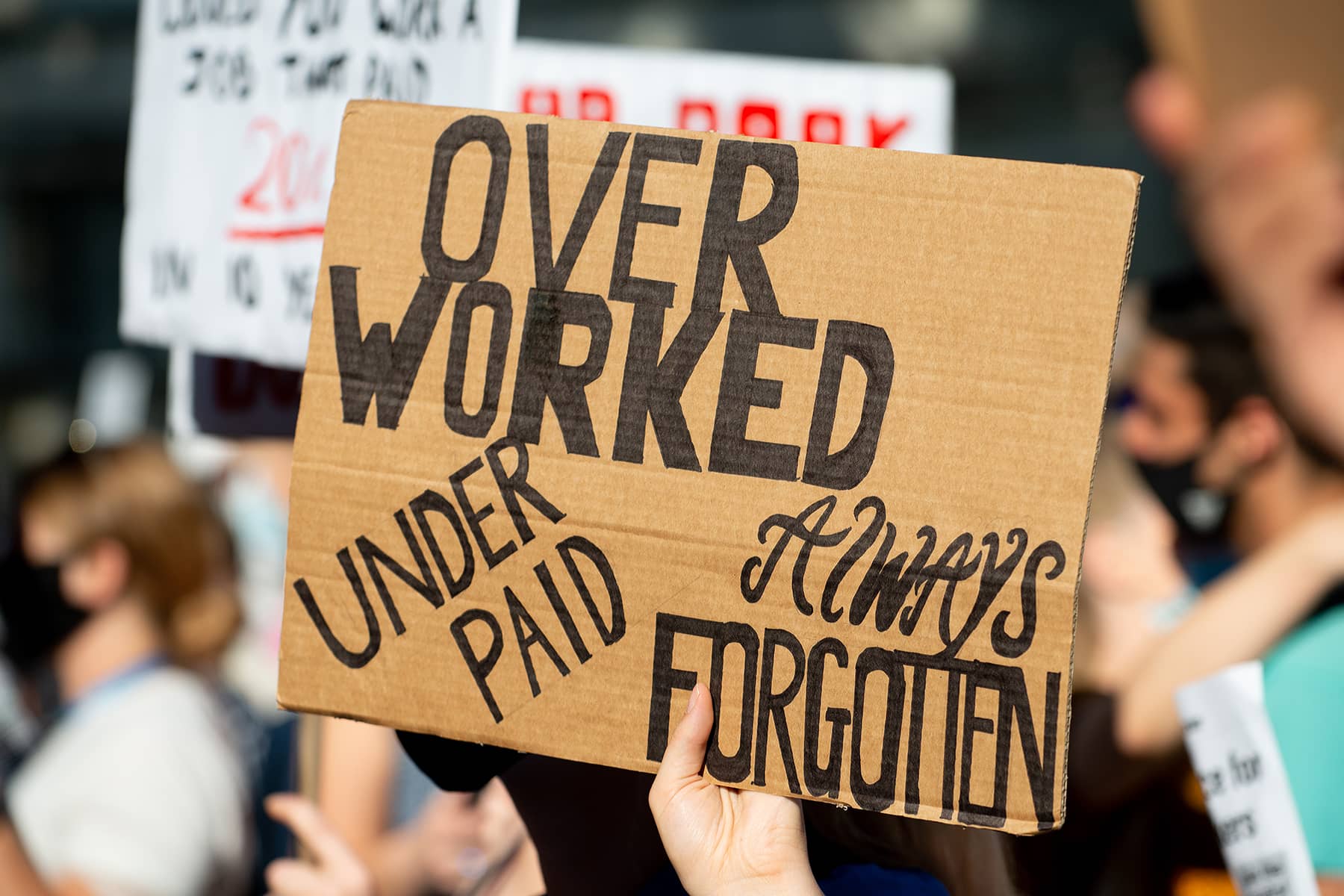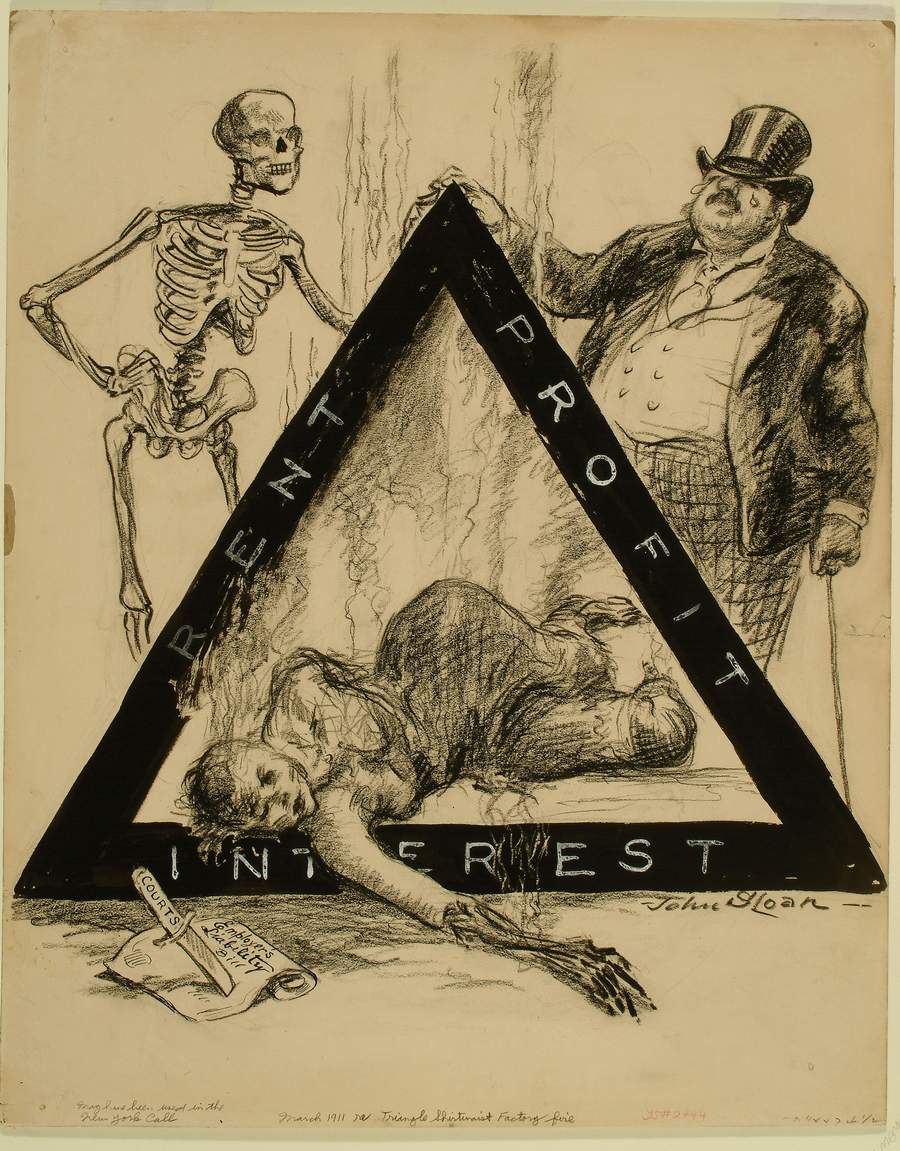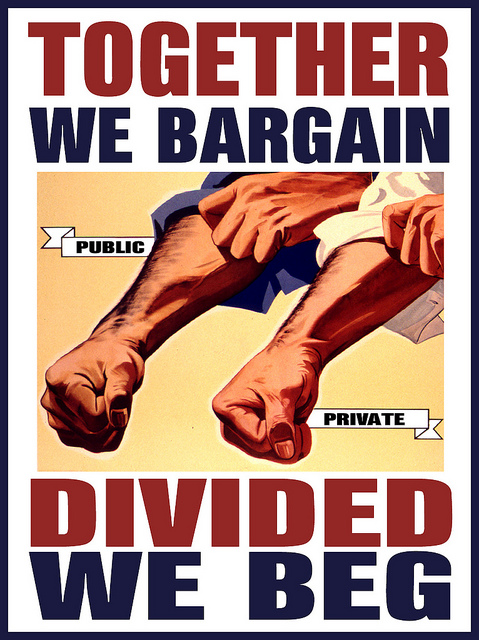I guess I've always tended to support unions, employee owned workplaces. and employee initiatives. From the time I got out of the Navy in 1979 to when I retired at the ripe old age of 55 in 2013, I've worked for several non-union companies. Most were decent, but some seriously "used and abused" their employees and left much to be desired. This resulted in a lot of employee turnovers, sloppy work, very low morale, hostile outbursts, and some unnecessary tense work conditions.
In every place I worked, I was asked by fellow employees to be the employee representative. I'm not sure why I was repeatedly chosen. Maybe they thought I'd be fair and balanced or perhaps it was because I wasn't bashful about challenging authority figures! Regardless, I was always honored by the trust and confidence my fellow employees had in me to take on the role of employee/management liaison.
My last position before retiring was that of "Special Coordinator to the President for Special Projects". Basically this was a assistant vice president position which functioned similar to my previous roles as a employee/management liaison. I was to provide a comprehensive report to the company president and the Regional Vice President along with recommendations for the improvement of company morale and productivity (in addition to my role as Senior Legal Manager, where I oversaw around 30 contract attorneys and managed a receivables portfolio of some $15 million dollars).
In addition to serving on several non-profit boards, I was appointed state chairperson of a national writers union (NWU 1918) where I served for 11 years. I handled state based issues and served on the local labor council. I was elected as the National Vice Chairperson of the At Large Chapter and served on several national committees. I also liaised with several worker oriented organizations.
Did you know organized labor has been chiefly responsible for establishing the 40 hour work week, health and other benefits, paid vacations and personal time, job safety (resulting in the creation of OSHA), an end to child labor (children as young as 8 years old were often working in mines), fiscal accountability of hours worked and wages earned? They promoted Social Security, unemployment insurance and worker's compensation for work related injuries.Equality and fairness in the workplace has always been a historically important union issue. Unions backed social causes like the Women's Suffrage Movement, Civil Rights, and the Chicano Movement of migrant farm workers and sharecroppers for fair wages, not to mention the Family Medical Leave Act, and the Uniformed Services Employment and Reemployment Rights Act (USERRA) which guaranteed returning military personal their old job back or paid training for a similar job in the event their earlier job or place of employment was gone. But these gains didn't come easy. They opposed President Clinton's "NAFTA", which was a disaster for American industries and blue collar workers.
It's estimated that at least 1100 individuals died fighting for worker rights (many murdered by "enforcers" hired by company bosses). Thousands more were injured. Some badly. Others permanently. Companies used every form of intimidation imaginable, from reducing hours for hourly employees (or overloading them with hours and no breaks or rest time), ostracizing employees (and anyone who associated with them) to outright firing them. A lot of blood was spilled for these "concessions".
Since the advent of the modern Industrial Age, countless workers, mostly women, worked for low wages in the textile industry, often in hot and unsafe conditions. Many were maimed or killed. With no daycare, the women often brought their children with them, tucking infants and small children under chairs or beside their machines. Not surprisingly injuries or some other mishap wasn't uncommon among the children, such as lung disease, hearing loss, or the loss of a finger.
In 1911, some 600,individuals, mostly women, were working at the Triangle Garment Company, owned by Max Blanck and Isaac Harris, and located in the Greenwich Village district of Manhattan. The company occupied the top three floors of the ten storied Asch Building (now the "Brown Building"). For the time, the building was often billed as being "fireproof" (like the unsinkable Titanic in 1912 I guess).
The women, mostly young and recent Jewish and Italian immigrants, were engaged in manufacturing of women's blouses, an industry declining in popularity. The women worked 9 hours a day and earned between $7 and $12 a week conditions were stifling. Windows were often kept shut and typically management required all doors to be closed and locked from the outside (a supervisor had the key).On the late afternoon of March 25th, a fire mysteriously broke out in a rag bin and quickly spread. As all the doors were locked from the outside, the only options were burning alive, smoke inhalation, or jumping out the windows to certain death. Many chose the latter. 146 individuals---123 women and 23 men---perished in what was one of the worst disaster in the history of the garment industry.
Although sued by family members, with no safety regulations, the two owners were found innocent. Meanwhile, their insurance company paid Harris and Blanck $60,000 for the loss of their business. That equates to $75 per life lost, of which the families never saw a dime (it was never determined if the fire was accidental or not, but it's worth noting that the two owners had been found guilty on four occasions previously of insurance fraud by arson). OSHA would not be founded for another 60 years when, after intense union pressure, it was signed into law by then President Richard Nixon.
In company owned towns (which were common in and around mines and lumber mills) reprisals for union organizing may include refusal of service at company owned grocery stores (workers weren't paid in U.S. currency, but in company script which was worthless anywhere else), evictions from company owned housing, the rape of wives and daughters, expelling their children from company run schools, and verbal condemnation at company approved churches (attendance was often mandatory). If the "problem" couldn't be resolved "in-house", the company would often employ "other measures".
"Other measures" often took the form of militias or recruited vigilantes, private security companies (like the Pinkertons), hiring (aka bribing) local cops to break up protests as brutally as possible. If that failed, company presidents would use their influence to get the governor (who was usually in their back pocket anyway) to call out the National Guard and "restore order" and detain ring leaders.
Since many of the workers were Black, German, Irish, Scots, Welsh, Jewish, Asian (predominantly Chinese) or Italian, there was no shortage of hate groups willing to inflict as much violence as possible and get paid for it! Arson or the use of dynamite were often employed as "tools of anti-union trade" and when those tactics didn't work, it sometimes came down to cold blooded murder.The result was decades of bloody "wars" between companies and their employees from the steel mills of Pittsburgh, the docks of New York, the coal mines and hollows of Appalachia, and the automobile factories of the Northeast. Ultimately, the workers won, at least in the short term.
Unions were finally officially recognized thanks to the passage of "National Labor Relations Act of 1935" (aka "The Wagner Act") on the heels of the Great Depression and signed into by President Franklin D. Roosevelt. FDR was perhaps the most labor friendly president in our country's history.
His long time friends and opponents, mainly on Wall Street, often called him a "traitor to his class", and perhaps he was. The aim of the "Wagner Act" was to mediate differences between labor and management in order to prevent strikes and work stoppages which weaken an already struggling economy. But the fighting between workers and owners needed to stop for the sake of the nation's economic health (ultimately is wasn't the recognition of unions which saved the economy, but World War II).
Eventually Big Business was able to claw back many of their concessions. There was no way they were going to allow the political clout of organized labor to stand. In 1949, with bipartisan support, the 80th Congress went over President Harry Truman's head and enacted the "Taft-Hartley Act".
The act restricted many of Labor's actions against employers, specifically wildcat strikes, political strikes, solidarity strikes and secondary boycotts. It prohibited discrimination against non-union members, and additional rights such the right to vote out a union and the right of companies to vote on a union's demands, but it didn't stop there.In 1959, Congress enacted the Landrum-Griffith Act which was made law with President Dwight Eisenhower's signature. Also known as the "Labor Management Reporting and Disclosure Act", the law was primarily geared to protect union members from any corrupt activities of union officials may be engaged in. This was the era of organized crime's takeover of a number of unions, notably the "big four", the International Longshoremen, the International Brotherhood of Teamsters, Laborers International of North America, and Hotel Employees and Restaurant Employees International.
It made union participation or involvement in racketeering, bribery, extortion, misuse of union funds, intimidation of workers illegal. Anyone found guilty could be removed from their union position and race fines or even jail time. It also created a "Bill of Rights" for union members (which was later extended to include non-union employees as well).
It should bear mentioning that the Landrum-Griffith Act was passed during the era of "McCarthyism", "the red Scare", and the "Cold War". The importance of this and how it relates to unions is that many of the early union leaders admitted to being socialist or Communist. Perhaps the best known of these was Robert Le Follett, A. Phillip Randolph, Mary Harris "Mother" Jones, Eugene Debbs and Samuel Gompers.
Some of the unions which had a large socialist or Communist membership included the CIO and AFL, the UAW, International Union of Electrical Workers, International Workers of the World ("Wobbles"), the Transport Workers Union, the Longshoremen, and the United Steelworkers.
In addition, many of the laws passed in the 1930's like Social Security, unemployment, the right to unionize and strike were all labeled as "anti-American", "socialist" and "Communist". Nevertheless, most of these laws are not just still with us, but have become institutionalized as a "national right".Unions are said to have created the middle class, which may very well be true, but it's not been all wine and roses. I voluntarily joined the NWU. I wasn't coerced into joining. It offered me an advantage and I felt I had something I could offer the union. I was honored to have been the liaison on behalf of my fellow employees for 34 years. We accomplished a great deal for ourselves and the company's bottom line. Lastly, while I support unions and the right to organize and bargain for better pay and work conditions, I also believe in free choice and not being compelled into joining any organization.
However, those individuals who decline to join should not expect to receive all of the benefits that their fellow union employees do. That's the trade off. It's called personal responsibility. For me, it's just that "something" about being told I "must" do or participate in something without being given a choice that irks me to the core. I bet no one is surprised to read that! We also have to remember the years of corruption and crime which has smeared the reputation of organized labor, perhaps forever.
Finally, unions refuse to think outside of the box, or to be more accurate, outside of the hip pocket of the Democratic Party which, like the Republicans, greedily serves Wall Street. Union leadership has consistently failed to protect the best interests of its members by not making the major parties or candidates compete for its support. Labor must look elsewhere, even if it means forming it's own political party (we're the only industrial nation without a Labor party) or face eventual extinction.
So, that's a brief history of Labor Day and why you get a three day weekend marking the last "official" holiday of the Summer, but remember the high price others paid for you to have that one extra day off.
If you enjoyed the article, please consider passing it along to others and don't forget to subscribe. It's free! Lastly please be sure to "like" us on whatever platform you use to read anotheropinionblog.com. It helps beat the algorithms and keeps our articles in circulation. Thank you!
Lists of worker deaths in United States labor disputes
No union mines left in Kentucky, where labor wars once waged
History of union busting in the United States
Triangle Shirtwaist Factory Fire
USERRA: A Guide to the Uniformed Employment or ReemploymentAct
Communist Party USA and the American labor movement (1919 -1937)
Communist Party USA and the American labor movement (1937 -1950)











